Guiding the next generation of students on Indigenous policy
Trio of Zuckerman College of Public Health mentors work to develop knowledge about Native self-governance.
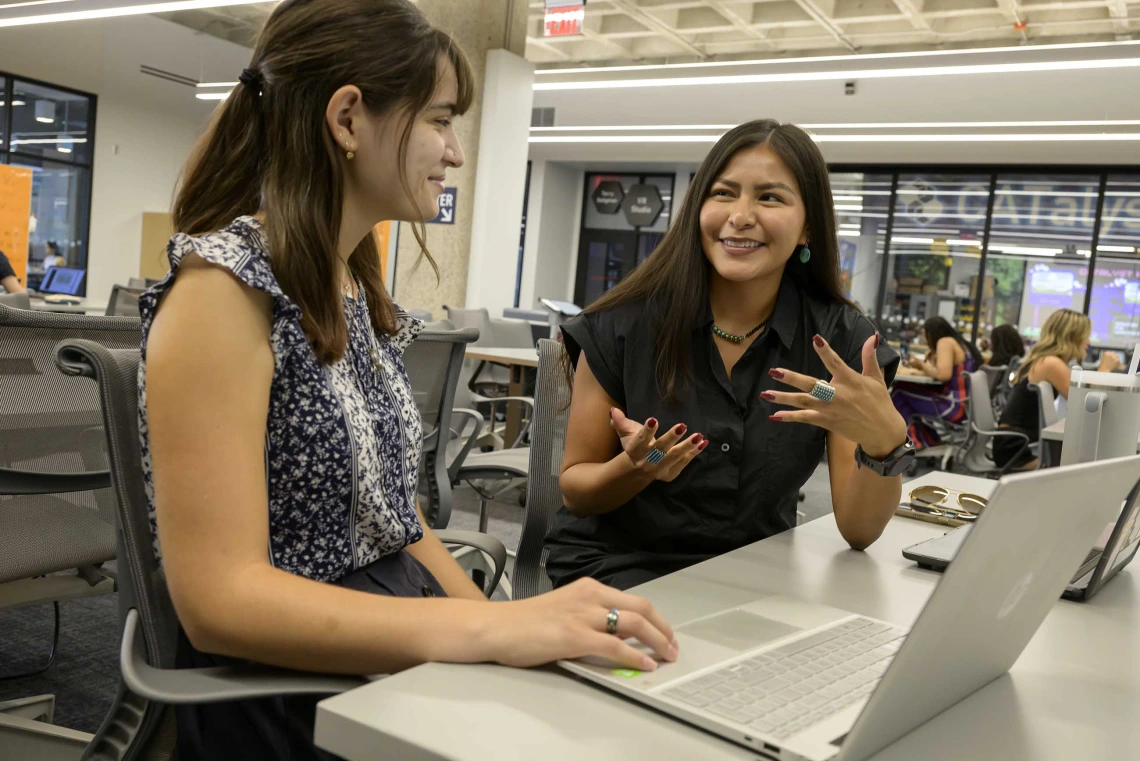
Caleigh Curley, right, is one of three University of Arizona Mel and Enid Zuckerman College of Public Health staff and faculty members mentoring students on Indigenous governance policy. She is working with U of A senior Alyssa Wood, left.
Photo by Kris Hanning, U of A Health Sciences Office of Communications
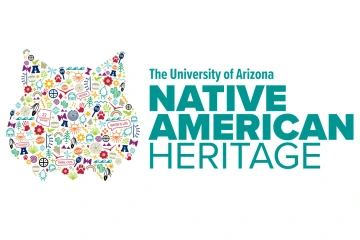
If it were up to Caleigh Curley, Native American Heritage Month would be a lot longer than 30 days.
“Every day is an opportunity to honor the culture, traditions and history of Indigenous people and the sacrifices they have made for this country,” said Curley, who is Diné and Hopi.
Curley, a research program administrator for the University of Arizona Mel and Enid Zuckerman College of Public Health, is doing her part to extend Native American Heritage Month at least another three and a half months — and hopefully beyond.
She is one of three Zuckerman College of Public Health staff and faculty members laying the groundwork for the next generation of students to develop a deeper understanding of Indigenous rights and governance as mentors in the Mo’s Policy Scholars program.
The Udall Center for Studies in Public Policy’s flagship project is a 14-week paid mentorship program for nine U of A juniors or seniors who are interested in having an impact on environmental and Indigenous governance policy. Now in its second year, Mo’s Policy Scholars is named for longtime Arizona congressman Morris K. Udall, who championed Native self-determination and governance in his 30 years in Congress.
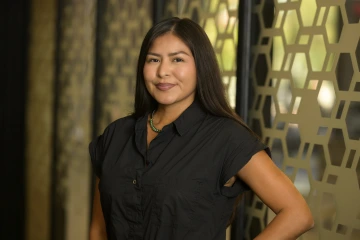
Caleigh Curley, who is Diné and Hopi, said she would have loved to have participated in a program like Mo’s Policy Scholars as an undergraduate.
Photo by Kris Hanning, U of A Health Sciences Office of Communications
“It’s an awesome opportunity for students to really understand Tribal sovereignty and its role in Indigenous governance,” said Curley. “I grew up in San Antonio, Texas, where the education system did not provide a full factual and comprehensive history of Native People and the devastating impact of colonization on our communities.
“So, I think the Mo’s Scholars program is really impactful for allowing students to gain mentorship and knowledge of Indigenous governance policy so they can then apply it to their research and field of study.”
Fellow mentor Ibrahim Garba, SJD, an assistant professor at the Zuckerman College of Public Health with a joint appointment at the Udall Center and its Native Nations Institute, said he loves the opportunity to work directly with students, who are the key to future progress.
“Indigenous policy issues are usually on a timeline of decades and centuries,” said Garba. “So, you have to think in terms of how do I prepare the next generation to think about the work that’s needed to advance Indigenous self-determination going into the future? This program is a way to be doing that. Here’s what we’re doing in our time, but how are we exposing them to experiences and conversations that prepare them to be having the same conversations with the next generation?”
Garba, who is Karai-Karai and originally from Nigeria, said it’s important for students to recognize the complicated nature of public policy in the United States.
“They need to understand at a deep and historical level that Indigenous peoples and other minoritized populations have had a complicated relationship with public policy because public policy has often been used to control them rather than include them in democratic decision making,” he said. “I’m trying to, at the very least, get them to begin to think in a more nuanced way about policy, what their role is in it, how it affects Indigenous peoples and how then you can bring that Indigenous perspective into the regular policy-making space.”
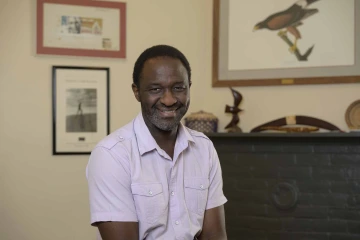
Ibrahim Garba, SJD, said it’s vital to teach students about the complicated nature of public policy and minoritized populations.
Photo by Kris Hanning, U of A Health Sciences Office of Communications
Stephanie Russo Carroll, DrPH, MPH, an associate professor at the Zuckerman College of Public Health jointly appointed as an associate research professor at the Udall Center and its Native Nations Institute, is a mentor and helped create the program. Carroll, who is Ahtna, was thrilled by how many Indigenous and non-Indigenous students applied to participate.
“It is heartening to see in the younger students an attitude that it is their responsibility to avail themselves of learning about Indigenous sovereignty,” she said.
By working with mentors on specific projects with an Indigenous angle, the students also see firsthand “how you action science and research for the benefit of communities,” Carroll said.
History major and U of A senior Alyssa Wood, who is partnered with Curley on Indigenous data sovereignty research in the medical field, said their project falls outside her field of study, which fits perfectly with her educational goals.
“I've tried to cultivate my studies and experiences in a very interdisciplinary way, with the goal of creating the most layered, well-rounded understanding I can,” Wood said. “One of the major layers to this is the large Indigenous population in Arizona and respecting as well as promoting nations' sovereignty.”
Before learning about Mo’s Policy Scholars, Wood said she had never heard the term “data sovereignty.”
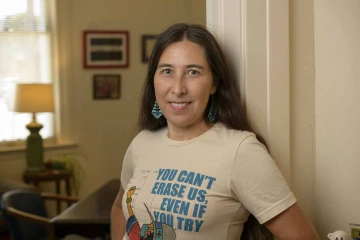
Stephanie Russo Carroll, who helped create Mo’s Policy Scholars, said she was heartened by how many students applied to participate.
Photo by Kris Hanning, U of A Health Sciences Office of Communications
“Now that I have, I have a better understanding of the issues and community-based solutions, as well as a better understanding of what it means to support Indigenous sovereignty in practice beyond the typical governmental idea of it,” she said.
Curley, who hopes to be a health policy advisor, said she would have loved to have had the chance to participate in a similar program as an undergraduate. Her own interest in policy was sparked while she was a student at Northern Arizona University, where she worked on the Navajo Nation Healthy Diné Act of 2014. The act included a 2% Navajo Nation sales tax on junk food and sweetened beverages. The revenues collected from the tax are used for local wellness programming.
“The initiative really highlights the importance of tribal sovereignty and how native nations are equipped to govern their communities and their people in a way that they think best meets their needs,” said Curley, who represented the Hopi Tribe at the Nov. 12 U of A women’s basketball game for Native American Heritage Month.
Juggling a full-time job overseeing research projects and her own studies takes up most of her time and energy, but Curley — an unofficial mentor to younger family members, counseling them on scholarships and other resources for higher education — decided that being a Mo’s Policy Scholars mentor was an opportunity too important to pass up.
“I really am thankful for the mentorship and guidance that I have had along the way,” Curley said. “I think this is a great opportunity to pay it forward.”

